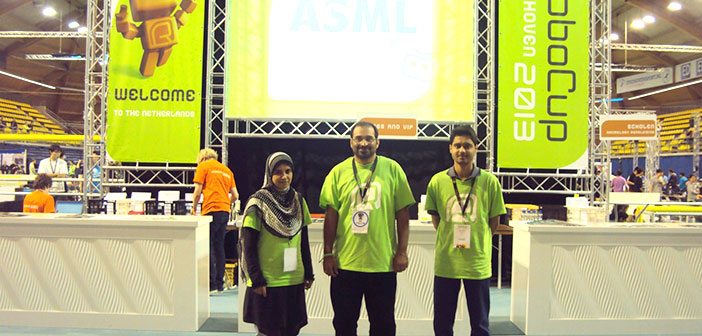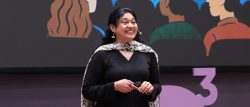Habib University’s Dr. Saleha Raza tells the story of how her team ended up in the top five of the World Robot Soccer competition
HABIB UNIVERSITY, February 18, 2016: Assistant Professor Dr. Saleha Raza, who is currently associated with Habib University’s School of Science & Engineering, narrated to a curious audience the story of KarachiKoalas – a team of simulated robots that she taught to play soccer – here at the Rashid Soorty & Family Lecture Theater.
Dr. Saleha Raza completed her Ph.D. from Institute of Business Administration (IBA), Karachi, where she was an active member of Artificial Intelligence Lab. KarachiKoalas is a simulated robot soccer team that was established in Fall 2010 as a joint venture between IBA, Karachi and University of Technology, Sydney.
Within few months of its inception, the team qualified for the World RoboCup and participated in the RoboCup Soccer Simulation 3D league. RoboCup Soccer is an international competition in which teams of robots play soccer. The objective is to promote education and research in the areas of Artificial Intelligence, Robotics and other related areas.
Dr. Saleha was the technical lead of KarachiKoalas and, in this capacity, she saw the team progress from the top 16 teams (in RoboCup 2011 – Turkey) to the top 10 (in RoboCup 2012 – Mexico) and, finally, to the top five (RoboCup 2013 – Netherlands).
But why did she choose to create a soccer team to research AI? Dr. Saleha explained that soccer offers a sufficiently complex environment in which you can test the boundaries of artificial intelligence.
In effect, if you can create a team of robots which can successfully play soccer, you can teach them to do almost anything else as well.
While recounting the journey of KarachiKoalas, she talked about the technical considerations that went into creating a team of simulated robots that could compete successfully in a competition dominated by big names like MIT, Carnegie Mellon, Texas Austin, Harvard, Oxford and Georgia Tech.
These considerations were divided into three major modules: Locomotion, which deals with making the robot walk, dribble, kick, dive etc.; Localization, which involves figuring out the positions of robots in the soccer field; and Strategy Building, which determines how the robots would coordinate in a team and make decisions based on the dynamics of an ongoing soccer game.

The team had a fantastic run at RoboCup 2013, which ended in the Quarter Finals round with KarachiKoalas ranked 5th in the tournament. According to the team’s website, KarachiKoalas had exciting match-ups against top teams like UT Austin, FCPortugal and SEURedSun (which both ended up in the semi-finals). It was also awarded the title of ‘Most Improved Team’ and given the ‘Best Presentation Award’.
Dr. Saleha was credited for the improvement in the team’s performance by the people behind KarachiKoalas. The team’s website states:
“Special credit goes to Ali and Saleha for making this accomplishment possible. Ali’s inverse kinematics based walk and Saleha’s behavior-based architecture and dynamic role assignment method provided major enhancement to our 2012 binaries.”
At Habib University, Dr. Saleha is interested in sharing her professional experiences with KarachiKoalas and providing her students a platform where they can be exposed to the exciting, yet challenging world of artificial intelligence in robotics, and become able to exhibit their potential at their best.




